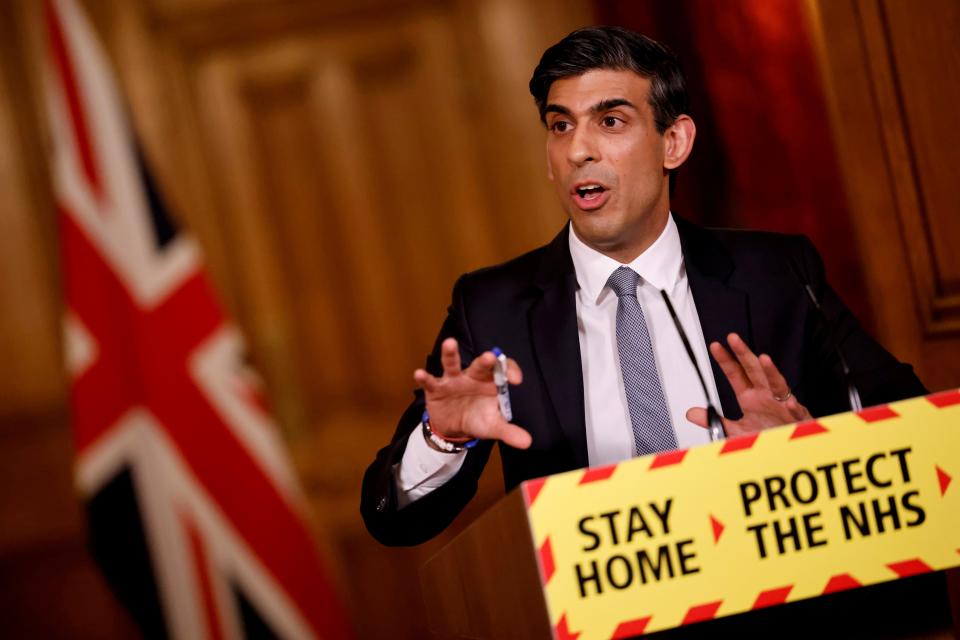Rishi Sunak may have to raise taxes further if economy recovers slowly, says OBR expert

Most experts have said governments should refrain from tax rises and spending cuts while economies recover
(Reuters)Rishi Sunak may have to raise taxes further to balance the books if the economy recovers more slowly from coronavirus than expected, a key government advisor has said.
Professor Sir Charlie Bean’s comments to the Commons Treasury Committee contrast with the views of a host of experts who have called for further financial stimulus to help economies through the current slump.
Sir Charlie, an economic expert at the government's fiscal watchdog the Office for Budget Responsibility (OBR), was asked by Treasury Committee chair Mel Stride what would happen to the public finances if the UK economy bounced back more quickly than forecast.
Sir Charlie said that short-term growth was less important than "scarring", meaning the longer-term damage that the pandemic has done to future growth.
The OBR expects that effect to cut longer-term growth by 3 per cent, which means lower tax revenues, Sir Charlie said.
"It's perfectly reasonable to argue that if we don't see that level of scarring then you don't need the same level of fiscal consolidation [tax rises or spending cuts] in the medium term.
"Basically if we get back on to the pre-pandemic trajectory that we were on so that there's no scarring, the fiscal consolidation that the chancellor announced last week - the freezing of personal [income] tax rate bands, the increase in corporate taxes - would, in theory, no longer be necessary to restore sustainability.
"Equally, if the scarring turns out to be... much bigger than we expect then potentially more consolidation would be required."
The assessment is in line with the OBR's remit of focusing on fiscal rules and reducing the deficit but is at odds with a number of experts and international bodies which have warned that cutting spending and raising taxes too early would further harm economies hit hard by the pandemic.
The International Monetary Fund and Organisation for Economic Co-operation and Development have both advised governments to be bold with their stimulus plans.
Andy King, a member of the OBR's Budget Responsibility Council, pointed out to the Treasury Committee that, unlike previous Conservative governments, the current one has not set any fiscal rules for the 2019-2024 parliamentary term.
Mr Sunak's predecessors as chancellor, George Osborne, Philip Hammond and Sajid Javid, have previously set targets for reducing the deficit, several of which have been missed because the economy has grown more slowly than hoped.
Without any fiscal rules the OBR is currently assessing tax and spending plans alongside the chancellor's "revealed preference" of achieving a budget surplus at some point in the future, Mr King said.
The chancellor could take the opposite approach to that outlined by Sir Charlie, he added.
That would mean allowing the national debt to rise so that higher levels of government support could be maintained if scarring turned out to be greater than expected, and bringing down borrowing more rapidly if the economy recovers more quickly.
Last week, the chancellor announced all income tax bands would be frozen from next year until 2026, a move that will drag millions more people into paying income tax.
Millions more will see their tax bills go up as average wages rise naturally with inflation. The headline rate of corporation tax will go up from 19 per cent to 25 per cent in 2023 but from this year companies will be given a “super-deduction” that means they can deduct 130 per cent of the amount they spend on capital investment from their tax bill.
Read More
If Rishi Sunak wants to ‘level with people’ he should stop peddling myths about the public finances

 Yahoo Finance
Yahoo Finance 